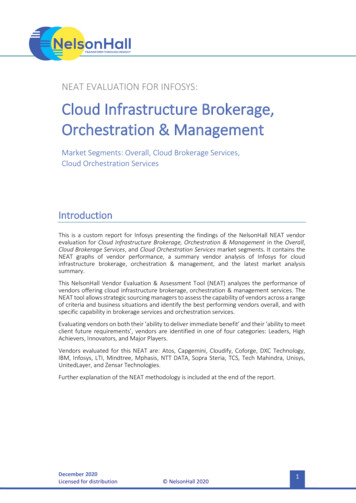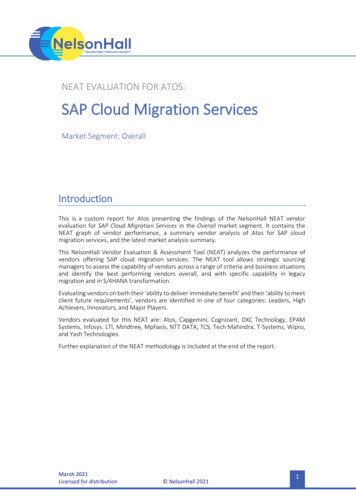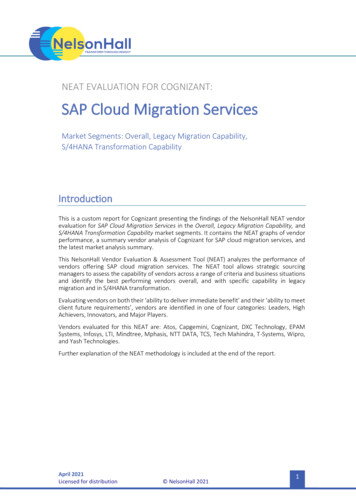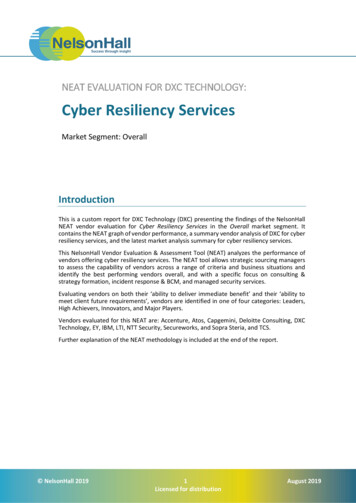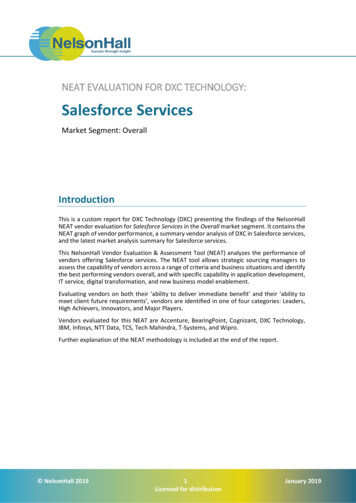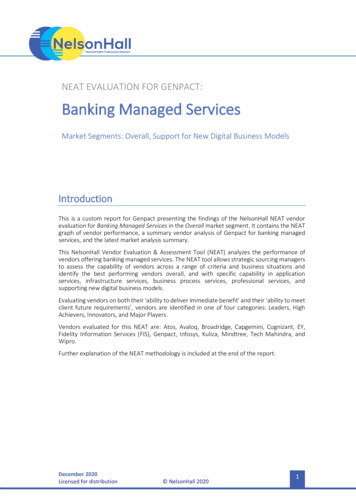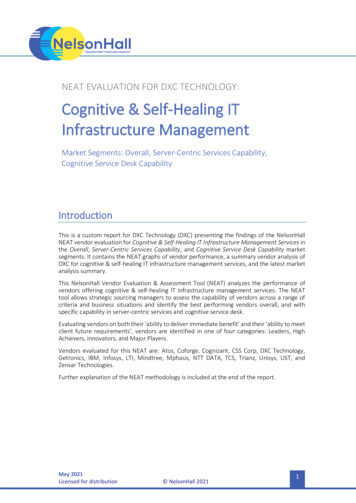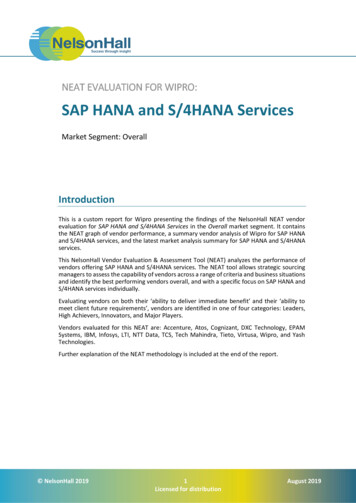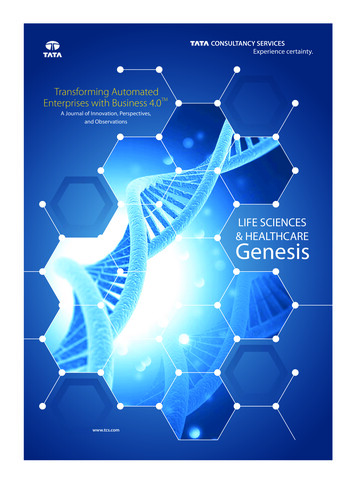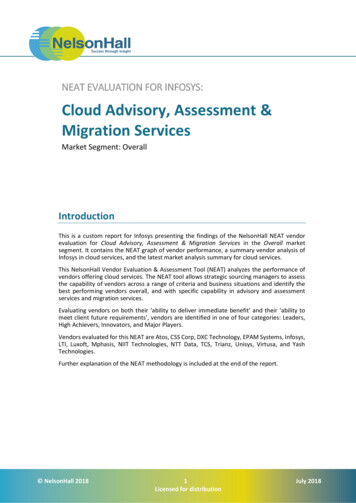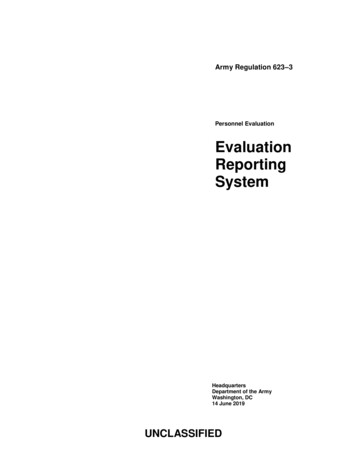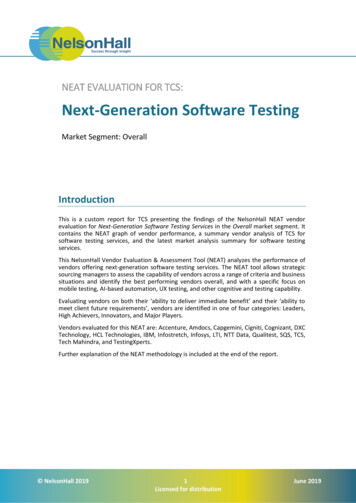
Transcription
NEAT EVALUATION FOR TCS:Next-Generation Software TestingMarket Segment: OverallIntroductionThis is a custom report for TCS presenting the findings of the NelsonHall NEAT vendorevaluation for Next-Generation Software Testing Services in the Overall market segment. Itcontains the NEAT graph of vendor performance, a summary vendor analysis of TCS forsoftware testing services, and the latest market analysis summary for software testingservices.This NelsonHall Vendor Evaluation & Assessment Tool (NEAT) analyzes the performance ofvendors offering next-generation software testing services. The NEAT tool allows strategicsourcing managers to assess the capability of vendors across a range of criteria and businesssituations and identify the best performing vendors overall, and with a specific focus onmobile testing, AI-based automation, UX testing, and other cognitive and testing capability.Evaluating vendors on both their ‘ability to deliver immediate benefit’ and their ‘ability tomeet client future requirements’, vendors are identified in one of four categories: Leaders,High Achievers, Innovators, and Major Players.Vendors evaluated for this NEAT are: Accenture, Amdocs, Capgemini, Cigniti, Cognizant, DXCTechnology, HCL Technologies, IBM, Infostretch, Infosys, LTI, NTT Data, Qualitest, SQS, TCS,Tech Mahindra, and TestingXperts.Further explanation of the NEAT methodology is included at the end of the report. NelsonHall 20191Licensed for distributionJune 2019
NEAT Evaluation for TCS: Next-Generation Software Testing ServicesNEAT Evaluation: Next-Generation Software TestingServices (Overall)NelsonHall has identified TCS as a Leader in the Overall market segment, as shown in theNEAT graph. This market segment reflects TCS’ overall ability to meet future clientrequirements as well as delivering immediate benefits to software testing services clients.Leaders are vendors that exhibit both a high ability relative to their peers to deliverimmediate benefit and a high capability relative to their peers to meet client futurerequirements.Buy-side organizations can access the Next-Generation Software Testing Services NEAT tool(Overall) here. NelsonHall 20192Licensed for distributionJune 2019
NEAT Evaluation for TCS: Next-Generation Software Testing ServicesVendor Analysis Summary for TCSOverviewTCS had initially set up its Quality Engineering & Transformation (QET), then under a differentname, in 1998. QET was a horizontal service line with P&L responsibility and aligned byvertical, mirroring TCS' vertical structure.In FY18, TCS initiated its Agile Strategy which implies all application services activities will bealigned around agile by FY20. As part of this transformation, the company changed the scopeof QET from a horizontal line to governing most of TCS's software testing service activities tofocusing on non-linear growth through test platforms.TCS was one of the early testing service vendors, emphasizing the notion of QA in this market,investing from 2010 onwards in IPs and platforms, and in its digital testing services portfoliosince 2013. QET continues to invest in both IP and service portfolios; examples include TCSDigital Video Assurance and BITS, its big data testing IP.As part of its IP creation, QET has been involved in the creation of two significant IPs:Customer Experience Assurance Platform (CXAP), and Smart QE Platform.NelsonHall estimates that approximately 40k career testers work across the different ISUs ofTCS.Mobile testingMobile testing was the first building block of QET's digital testing service portfolio. It still isthe largest of its digital testing activities.TCS has 300 mobile testing clients. The largest share of clients is in the BFS space, and then inretail. In the past 18 months, QET has seen an uptick in mobile testing by the communicationindustry.TCS is increasingly selling mobile testing contracts that include setting up a mobile lab or usingthe services from cloud-based mobile labs and their related software products, from vendorsincluding TestPlant, Experitest, and Perfecto Mobile.QET provides access to mobile labs through Perfecto Mobile, Experitest and EggPlant acrossseveral options: access to the cloud, on-premise or hosted in TCS' facilities (Experitest andPerfecto Mobile), and on-premise (EggPlant).TCS also provides access to Micro Focus Mobile Center, in its Customer Experience Center inChennai, and to its two shared service centers in Kochi. It also uses Sauce Labs and Amazondevice farm and has a mobile device lab servicing multiple clients in Kochi.TCS has several accelerators related to mobile testing: OMNI is an accelerator for executing test scripts across combinations of browsers,devices/desktops, OS; and also for web services (SoapUI, and RestAPI). OMNI integrateswith Jenkins for CI m-raft is an automation framework based on RAFT, specifically for mobile applicationsand websites. mRAFT integrates with ISV Testplant and Experitest, with defectmanagement software (MF ALM, and TestLink), and with CI (Hudson, Jenkins, andCruiseControl) NelsonHall 20193Licensed for distributionJune 2019
NEAT Evaluation for TCS: Next-Generation Software Testing Services ASAF is a recent mobile testing framework developed in Java that includes several of thefeatures of m-raft as well as features related to data (e.g., data conditioning, sub-settingand masking, ETL testing, and volume load generation), DevOps (e.g., version control(based on using GitHub and SVN); middleware testing), security testing: (e.g., ZAP); other(API testing and service virtualization (around SoapUI, Protractor, and WireMock), and adashboard and reports. An important element of ASAF is that it provides image testing,a compatibility testing IP comparing the initial image and its various rendering overphone devices, OS and browsers.UX testingTCS has a wide offering in usability testing. The offering includes: Functional testing: UI testing including look and feel, action and behavior, screen flow,moving from landscape to portrait Sentiment analysis: collecting end-user feedback Techniques are coming from usability research. Examples include using TechSmith'sMorae products, for creating usability labs based on desktop webcams, A/B n (NCPI) and i-userX.A usability testing accelerator is i-UserX. i-UserX focuses on user requirements (withinformation gathering templates and persona templates); usability testing test cases,feedback templates, and test scenarios; training and best practice materials; andintermediary assessments, as well as NCPI checklists, and heuristic analysis checklists.As part of its UX testing offering, TCS provides performance and security testing. Performancetesting includes: Load testing, using tools such as Micro Focus LoadRunner and Performance Center,Neotys Neoload, and Apache JMeter, and also taking a virtual load approach andnetwork virtualization Monitoring of applications in production, based on using tools from Dynatrace andAppDynamics.TCS is increasingly complementing its performance testing approach with UX testing toprovide an assessment of how the performance of an application impacts the customerexperience.A key element of the value proposition of TCS' UX testing offering is its CX Assurance Platform(CXAP). TCS launched CXAP in 2018 to focus on a website/mobile app’s five key attributes:compatibility, usability, security, accessibility, and performance (CUSAP).TCS has structured its CXAP offering into four components, focusing on CUSAP: An assessment and benchmarking of the client’s web application CX (‘dipstickassessment’) The dipstick assessment is complemented by a KPI-based assessment that is based onother data sources, e.g., Google Analytics A sentiment analysis A test execution. NelsonHall 20194Licensed for distributionJune 2019
NEAT Evaluation for TCS: Next-Generation Software Testing ServicesRPA and testingTCS provides RPA testing as part of its RPA engagements and favors end-to-end engagements.The company highlights that usage of chatbots is most used in BFSI and retail for engagingwith customers and accessing information. TCS has 70 clients for its RPA services. Servicesprovided include: RPA strategy CoE set up RPA software selection Implementation Operations.Key partners include Blueprism, Automation Anywhere, UiPath, Pegasystems, andWorkFusion.TCS has 2k personnel working on RPA projects, focusing on F&A, HR, SCM, and ERP.The company estimates that 25% of an RPA effort is related to testing services. TCS is workingon: Testing RPA software Testing bots.AI and testingTCS Launched its Smart QE IP in 2018, with the intent of driving automation and bringing AIcapabilities to continuous testing. Smart QE has several AI use cases, for automating testing: Dynamic root cause analysis of defects, incidents and log correlation Code path analyzer, for determining the impact of code changes on test cases. The toolinitially generates a knowledge base across code components at the server (e.g., classes,methods, and LoCs) and UI (e.g., HTML) levels, and links these components with testcases. It will, for new releases, assess the impact of new code on its repository and, as aresult, on the corresponding test cases Smart QE maps, which assesses the maturity of an application and maps the elementsfor providing analytics QE-bots, with the intent of automating certain tasks. Initially, TCS has automated theprovisioning of test environments through a chatbot.Along with its investment in AI use cases, TCS continues to enhance the functionality of SmartQE Platform; e.g. static code analysis, continuous deployment, dashboards, and a self-serviceportal. These enhancements and new functionality are incremental. Examples include theimpact of code change in testing data format and requirements and monitoring theavailability of test environments. NelsonHall 20195Licensed for distributionJune 2019
NEAT Evaluation for TCS: Next-Generation Software Testing ServicesFinancialsNelsonHall estimates that TCS had software testing service revenues of 2bn in CY 2018, andthat TCS’ next-gen testing service revenues in 2018 were 450m.Strengths Scale: TCS is a top two testing service vendor by headcount and revenues. It has thebudget and willingness to invest in its services portfolio, IP, and commercial activity, andit has demonstrated in the past it would do it Mobile testing: the offering is comprehensive and backed by many IP UX testing: the offering is comprehensive and ahead of the competition, backed by itsCX Assurance Platform AI use cases: TCS has developed several AI use cases and is the first firm to havecombined it with its continuous testing platform, as part of Smart QE.Challenges Cognitive system testing: TCS is currently expanding its testing capabilities around AI andRPA Onshore presence: TCS has not grown its onshore testing presence significantly, andNelsonHall does not expect it to. With the continued adoption of digital and agile, TCSwill need to adjust its ratio of offshore to onshore career testers.Strategic DirectionWith QET now focusing on driving non-linear growth, it is looking to create more IPs that itwill sell under a license and/or subscription fee.As part of its non-linear growth strategy, QET continues to enhance its key IP and has afunctional roadmap for them. An example of future functionality is for TCS Digital VideoAssurance platform, expanding the testing capabilities from video only to audio, chatbots,and voicebots.Another area where TCS will invest is for CXAP: QET wants to add functional testing to the UXcapabilities of the platform, focusing on regression testing.Another important element of the strategy of TCS is also to sell bundled testing services withbuild work. The company highlights that recent digital or next-gen projects such as RPA, AI,or blockchain systematically involve development and testing.Outside of QET, TCS is looking to expand its Digital Reimagination Center in Europe, initiallyin the U.K. and Northern Europe. NelsonHall 20196Licensed for distributionJune 2019
NEAT Evaluation for TCS: Next-Generation Software Testing ServicesOutlookLooking ahead, expect to see TCS: Continuing its investment in AI and ML technologies around data analytics for testing,and creating new use cases Training and re-skilling, which is the number one priority. NelsonHall 20197Licensed for distributionJune 2019
NEAT Evaluation for TCS: Next-Generation Software Testing ServicesNext-Generation Software Testing ServicesMarket SummaryOverviewThe software testing services industry is quickly shifting its services capabilities and portfolioto the context of digital and agile/DevOps. Overall, most vendors have created theircontinuous testing platforms, which are enhanced reference architectures and clients arecurrently deploying these.Vendors are turning massively towards AI, with the intent of using mostly NLP and MLtechnologies to automate testing services. The range of AI use cases is gradually expandingfrom analytics-based services to scriptless test automation, using web crawler technology.Vendors have prioritized AI use cases over other offerings. UX testing has high automationpotential. Other priorities will need to include testing of RPA software, of AI systems and alsoimplement RPA to automate testing.Buy-Side DynamicsThe three major software testing services buyer segments are: “Efficiency organizations”: clients of managed testing services are mostly IT departmentsand continue to be a large testing service segment. Efficiency organizations are currentlyworking on making their TCoEs relevant to digital. They are deploying automationthrough continuous testing approaches, AI and other cognitive technologies “Digital transformation-focused organizations” are business divisions rather than ITdepartments. They focus on their (mostly) external digital projects and want to ensurethe success of their project rollout through testing. Their challenge is to adopt the bestpractices of “digital natives,” e.g., frequent releases and agile development, focus on UX “Digital natives”: are organizations whose technology is a core part of their activity (e.g.,travel booking sites). They need high quality as thousands or millions of end-users usetheir services/products. They are continuous testing-centric.Key selection criteria for selecting a software testing services vendor are somewhat differentfor each client segment: “Efficiency organizations” consider a large presence in India as a given and now look for: Structured capabilities around DevOps to serve digital and agile projectsThe ability to expand their automation capabilities outside of test execution tocontinuous testing, and experiment AI use casesAlong with this automation effort, clients also want help in reskilling their manualtesters towards technical skills“Digital transformation-focused organizations” want their vendors to combine theflexibility and specialized capabilities of digital agencies while bringing their ability tobring automation, repeatability, and scale. Vendors need to demonstrate: NelsonHall 20198Licensed for distributionJune 2019
NEAT Evaluation for TCS: Next-Generation Software Testing Services A broad and deep next-gen testing portfolio, with investment in accelerators andplatforms to support the automationDigital consulting capabilities combined with industry knowledge, including a focuson UXFinally, “digital natives” have been engaged in digital for years and need to continue todevelop their digital leadership over competitors while benefiting from low-cost deliverythat will help them reach profitability in the mid-term. Such clients need a partnerworking in the long-run, not a one-off provider.Market Size & GrowthThe software testing services market is a maturing market, expected to grow by 5.6% overthe 2018-2023 period, growing from 23.0bn to 30.0bn.STS spending growth is still solid, growing one and a half time faster than IT services.However, it had slowed down very significantly from 12% growth ten years ago. The reasonsinclude the reduction in manual testing, the impact of economic condition deteriorations,and the decline in large managed testing services contracts.STS spending has shifted from managed testing services to project services. Since 2015, thenumber of new large-scale managed testing service contracts has decreased, and relatedspending is decelerating. NelsonHall expects this trend to continue, with clients looking tocontinue to decrease the cost of their managed testing contracts and reallocating servicestowards project services around automation, continuous testing and reskilling of their testingworkforce.Along with shift towards project services, spending is shifting from functional testing towardsspecialized testing services. Clients are investing in automating their functional testingactivities and moving away from manual testing. NelsonHall is, therefore, expectingfunctional testing to remain flat, with initial automation investment resulting in less manualactivites.Spending on specialized testing services is driven by: Next-gen functional spending ( 13%) Non-functional: driven by security and user-based performance testing ( 11%) Test support services: 8%.Next-gen testing accounts for 24% of software testing services spending. It is the fastestgrowth offering with a 12.8% CAGR for the 2018-2023. Growth is driven by mobile testing,which still accounts for 75% of all next-gen testing spending. NelsonHall 20199Licensed for distributionJune 2019
NEAT Evaluation for TCS: Next-Generation Software Testing ServicesOutlookOver the next few years, the main challenges of the software testing service industry are: Converging mobile and UX testing offerings, and invest into IP and platform to increasethe level of automation in UX testing, and expand to content testing and email campaigntesting Continuing investing in AI use cases for further automating testing services, beyond testautomation Including RPA in their its testing considerations for both automating testing of workflowsand bots, and using RPA software for automating testing Reorganizing their client’s TCoEs. A major issue will be reskilling of manual testers,towards becoming testing software specialists. This transition of skills will have divergentsuccess among testing personnel. At this point, it is not clear whether testing servicevendors will be able to effectively retrain manual testers or will have to turn to lay-offs Also, TCoEs in the long-term will need to provide an increasingly share of specializedtesting services, not only around next-gen testing, but also around test support services(test environment, test data, service virtualization) and non-functional. NelsonHall 201910Licensed for distributionJune 2019
NEAT Evaluation for TCS: Next-Generation Software Testing ServicesNEAT Methodology for Next-Generation SoftwareTesting ServicesNelsonHall’s (vendor) Evaluation & Assessment Tool (NEAT) is a method by which strategicsourcing managers can evaluate outsourcing vendors and is part of NelsonHall's Speed-toSource initiative. The NEAT tool sits at the front-end of the vendor screening process andconsists of a two-axis model: assessing vendors against their ‘ability to deliver immediatebenefit’ to buy-side organizations and their ‘ability to meet client future requirements’. Thelatter axis is a pragmatic assessment of the vendor's ability to take clients on an innovationjourney over the lifetime of their next contract.The ‘ability to deliver immediate benefit’ assessment is based on the criteria shown in Exhibit1, typically reflecting the current maturity of the vendor’s offerings, delivery capability,benefits achievement on behalf of clients, and customer presence.The ‘ability to meet client future requirements’ assessment is based on the criteria shown inExhibit 2, and provides a measure of the extent to which the supplier is well-posit
vendors offering next-generation software testing services. The NEAT tool allows strategic . the services from cloud-based mobile labs and their related software products, from vend
